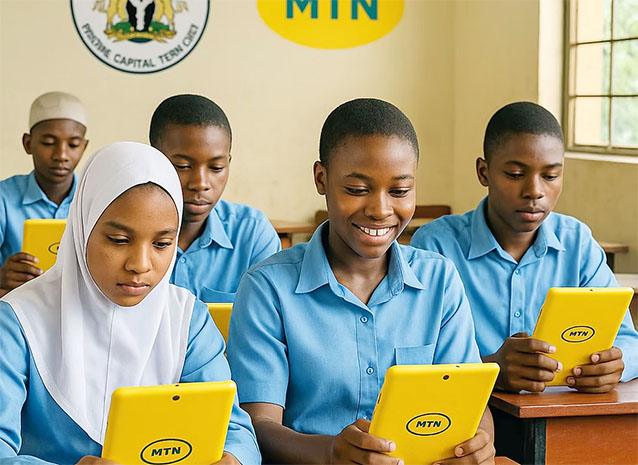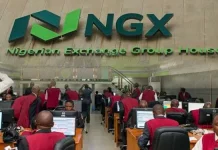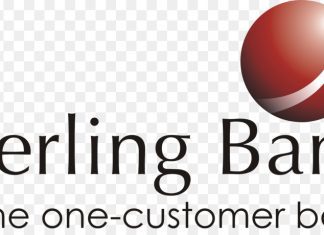According to Nicholas Uwerutonye, a new wave of digital transformation driven by strategic partnerships is changing how kids study, dream, and invent as Nigeria struggles with human capital development. It all started with a quiet revolution in Abuja’s public schools.
Last Friday, a silent but significant event took place in Abuja, a nation where policy promises and practical realities frequently conflict with regard to education.
By formally transferring 600 digital tablets to 12 public secondary schools in the Federal Capital Territory (FCT), the FCTA, in collaboration with telecom behemoth MTN Nigeria, took a significant step toward rethinking the future of public education.
“More than just a donation,” said FCT Minister of State Dr. Mariya Mahmoud, who was represented at the ceremony by her Special Assistant on Technical Matters, Michael Bawa.
As she put it, “These tablets are an investment in our children, in digital inclusion, and in the development of our country.”
The immediate excitement of transferring equipment is only one aspect of the importance of such a collaboration. It touches on the core issues of Nigeria’s human development: a widening digital divide, a lackluster educational system, and restricted access to contemporary resources.
Although Abuja is the capital of the country, many of its public schools have long functioned in an environment that is disconnected from the technology innovations that characterize education in the twenty-first century.
MTN Nigeria’s donation is a component of a larger nationwide initiative.
As part of its corporate social responsibility (CSR) to support digital education and create classrooms that are prepared for the future, the telecom company has announced that it is giving 4,600 tablets to public schools in Nigeria.
The action is about “supporting access to digital learning” and building an ecosystem where no student is left behind in the rapidly evolving digital age, according to Ernest Ndukwe, Chairman of the Board of MTN Nigeria.
The benefits are both practical and symbolic for the FCT. Through the devices, students will be exposed to digital research, interactive learning, and customized study habits that are prevalent in higher education systems worldwide.
Beyond technology, though, they will bring about a change in perspective—from reliance on textbooks to multimedia learning, from teacher-centered models to student-driven inquiry, and from rote memorization to critical thinking.
Mandate Secretary Danlami Hayyo’s representative, Kolawole Olabashola, Director of the Department of Science and Technology in the FCT Education Secretariat, accurately described the excitement.
He claimed that this program would put our institutions in a competitive position on a worldwide scale. “It gives students in public school new opportunities and helps close the digital divide.”
These “new horizons” are not merely poetic; they are essential. The World Bank estimates that over 60% of children in a country of more than 200 million people live in “learning poverty,” which is defined as not being able to read and comprehend a simple text by the age of ten.
Due to low educational attainment, restricted access to healthcare, and slow economic participation, Nigeria continues to have one of the lowest Human Development Indexes (HDI) in the world.
If widely embraced, digital learning presents a unique chance to reverse this dire trend. According to experts, integrating digital technologies into the public education system, such as internet access, teacher training, and content-rich platforms, could eventually boost test scores by 30% and retention rates by up to 20%.
Additionally, kids with digital literacy are better equipped for a global labor market that is favoring tech-savvy workers over those with more conventional skill sets.
However, there are expenses associated with this change. It would cost Nigeria an estimated ₦300 billion to outfit just 50% of its public secondary schools with digital tablets, e-learning materials, and dependable infrastructure.
The amount can become close to ₦500 billion over five years if teacher training and digital lab upkeep are added.
Although this amount may cause some people to wonder, the return on investment is significant.
Read Also: Abuja’s Original Inhabitants Sidelined as Capital Expansion Erodes Their Economic and Political Rights
Rwanda, Kenya, and Estonia are among the nations that have implemented national digital education frameworks and have shown quantifiable improvements in employment, civic involvement, literacy, and creativity.
Each kobo invested in Nigeria is not only an expense but also a contribution to the country’s wealth, peace, and production.
The FCTA-MTN collaboration is an important case study because of this. It provides an example of how the public and private sectors can work together to jointly produce value for the coming generation.
Additionally, it communicates to other corporate players that education is a shared goal rather than merely a government duty.
Additionally, the program is a perfect fit with President Bola Ahmed Tinubu’s Renewed Hope Agenda, which emphasizes youth empowerment, digital inclusion, and education reform as key pillars of national growth.
Projects like these have the power to inspire communities, improve schools, and transform today’s underprivileged youngsters into tomorrow’s leaders, inventors, and creators if they are carried out regularly.
More than just processors and pixels, the 600 tablets have promise as they start their trip into Abuja classrooms. a pledge that all children should have the opportunity to learn, compete, and prosper in the digital era, irrespective of their financial situation.
a pledge that long-neglected public schools can develop into centers of innovation and quality. And above all, a pledge that Nigerian education’s future is not just possible but also achievable.
And every dollar spent will be worthwhile if that future starts with a single student in Abuja using a tablet screen to realize their full potential.
Join Television Nigerian Whatsapp Now
Join Television Nigerian Facebook Now
Join Television Nigerian Twitter Now
Join Television Nigerian YouTUbe Now





